Understanding Kidney Function: 21 Essential Aspects
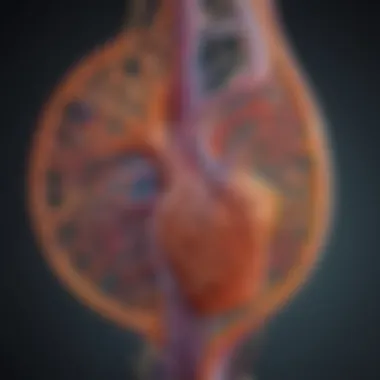

Intro
The kidneys are essential organs in the human body, responsible for numerous functions that are vital for sustaining life. They maintain homeostasis, regulate fluid balance, filter waste products, and contribute to electrolyte equilibrium. This article emphasizes the critical role of kidney function, detailing its 21 essential aspects. Understanding these components is vital for both health professionals and those seeking to enhance their knowledge of human biology.
The complexity of kidney operations often goes unnoticed until dysfunction occurs. This can lead to various health issues, from chronic kidney diseases to acute renal failure. Thus, increased awareness about how kidneys function becomes crucial not only for medical students and professionals but also for the general public.
By delving into the physiological roles of kidneys, the biochemical processes at play, common disorders affecting renal health, and methodologies for assessing kidney performance, this article aims to offer comprehensive insights. Through this exploration, a broader comprehension of kidney function can be achieved.
Prelims to Kidney Function
The kidneys serve as critical regulators of numerous physiological processes within the human body. Understanding kidney function is vital not only for medical professionals but also for anyone interested in maintaining their health. The kidneys filter blood, removing waste and balancing fluids and electrolytes. This role directly relates to conditions like hypertension and diabetes, as kidney dysfunction can exacerbate these diseases. As we progress through the details of kidney function, we uncover the intricate workings that sustain life, illustrating the relevance of each aspect.
Overview of Kidney Anatomy
Kidneys are bean-shaped organs approximately the size of a fist, located on either side of the spine, just above the waist. Each kidney contains approximately a million functional units known as nephrons. A nephron consists of a glomerulus and a renal tubule, crucial for filtering blood and processing waste. The renal pelvis collects urine before it is sent to the bladder. Understanding this anatomy is foundational to appreciating how each component contributes to the overall renal function.
The outer layer of the kidney is called the cortex, while the inner area is the medulla. Blood flows into the kidneys through the renal arteries and exits through the renal veins. The kidneys also host a complex network of blood vessels and drainage systems that are essential for their functions.
Basic Functions of the Kidneys
The kidneys perform several critical functions:
- Filtration of Blood: They filter out toxins, excess salts, and metabolic waste from the bloodstream.
- Regulation of Electrolytes: They control levels of important electrolytes such as sodium, potassium, and calcium.
- Acid-Base Balance: They help maintain the body’s pH by excreting hydrogen ions and reabsorbing bicarbonate from urine.
- Fluid Balance: They regulate the volume of blood plasma, thus controlling blood pressure and ensuring adequate hydration.
- Hormonal Regulation: The kidneys produce hormones such as renin, which is crucial for blood pressure regulation, and erythropoietin, which stimulates red blood cell production in the bone marrow.
"The kidneys are essential for maintaining homeostasis, which is vital for the survival of all biological systems."
The combination of these functions highlights how the kidneys contribute to overall health. Dysfunction in any of these areas can lead to significant health issues, underscoring the importance of understanding kidney functions fully.
Filtration Processes in the Kidneys
Understanding the filtration processes in the kidneys is essential for comprehending how these organs maintain homeostasis in the human body. The kidneys filter blood, remove waste, and regulate fluid and electrolyte balance. This filtration is crucial for preventing the accumulation of harmful substances in the body and for maintaining optimal physiological function. The processes of glomerular filtration, tubular reabsorption, and tubular secretion work in harmony, ensuring that the body retains necessary substances while excreting waste.
Glomerular Filtration
Glomerular filtration is the first step in renal filtration. Blood enters the kidneys through the renal arteries and reaches the glomeruli, which are complex networks of capillaries located in the nephron. Here, blood pressure forces water, ions, and small molecules through the filtration membrane into the Bowman's capsule, forming a fluid known as filtrate.
One key aspect of this process is the filtration barrier, composed of endothelial cells, the basement membrane, and podocytes. This barrier selectively allows certain substances to pass while preventing larger molecules, such as proteins and blood cells, from entering the filtrate. The efficiency of glomerular filtration rate (GFR) is determined by various factors, including blood pressure and the overall health of the glomerular structure. Maintaining an adequate GFR is vital for kidney health; reductions can indicate potential kidney issues.
Tubular Reabsorption
After glomerular filtration, the next step is tubular reabsorption. As the filtrate passes through the renal tubules, important substances such as glucose, amino acids, and essential ions are reabsorbed back into the bloodstream. This process occurs mainly in the proximal convoluted tubule and is critical in conserving valuable nutrients.
In tubular reabsorption, mechanisms like active transport and passive diffusion play important roles. Transport proteins help move substances against their concentration gradient, while osmosis facilitates the reabsorption of water. The kidneys regulate reabsorption according to the body's needs. For instance, if the body is dehydrated, more water is reabsorbed, concentrating urine. Understanding how this process functions can provide insight into many health conditions, including diabetes and chronic kidney disease.
Tubular Secretion
Tubular secretion is the final stage in the kidney's filtration process. It involves the transfer of substances from the bloodstream into the renal tubules. This process primarily takes place in the distal convoluted tubule and the collecting duct. Through active transport and certain channels, the kidneys secrete waste products such as urea, creatinine, and excess potassium ions into the urinary filtrate.
This ability to remove excess components is crucial for maintaining electrolyte balance and eliminating toxins from the body. In certain cases, the secretion process can also be influenced by medication, where drugs may compete for the same transport pathways. Understanding tubular secretion is critical not only for renal physiology but also for pharmacology, as it can impact how medications are metabolized and eliminated from the body.
The filtration processes in the kidneys represent a finely-tuned mechanism necessary for health. Disruptions in these processes can lead to serious health issues.
By exploring these critical processes—glomerular filtration, tubular reabsorption, and tubular secretion—we gain a clearer view of kidney function and its relevance to overall health. Recognizing how these functions interconnect is essential for both medical professionals and researchers working to advance treatments for kidney-related disorders.
Regulation of Electrolytes
The kidneys serve a crucial role in the regulation of electrolytes. This balance is essential for numerous bodily functions. Electrolytes are minerals that carry an electric charge and include sodium, potassium, calcium, and magnesium, among others. Proper regulation of these substances is vital for heart function, muscle contractions, and maintaining fluid balance. A malfunction in this regulation can lead to significant health issues, making it an essential topic in understanding kidney function.
Role of Sodium
Sodium is a key electrolyte involved in many physiological processes. It is primarily responsible for regulating blood pressure and volume. The kidneys control sodium levels by filtering it through the glomeruli. Excess sodium can be excreted, while necessary amounts can be reabsorbed back into the bloodstream through the renal tubules. This mechanism helps maintain a stable environment within the body.
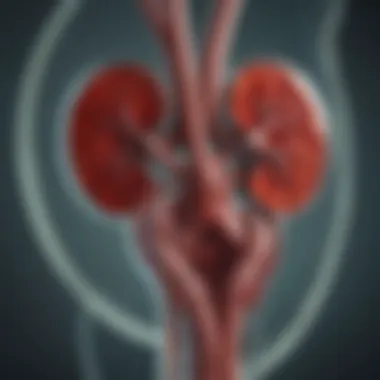
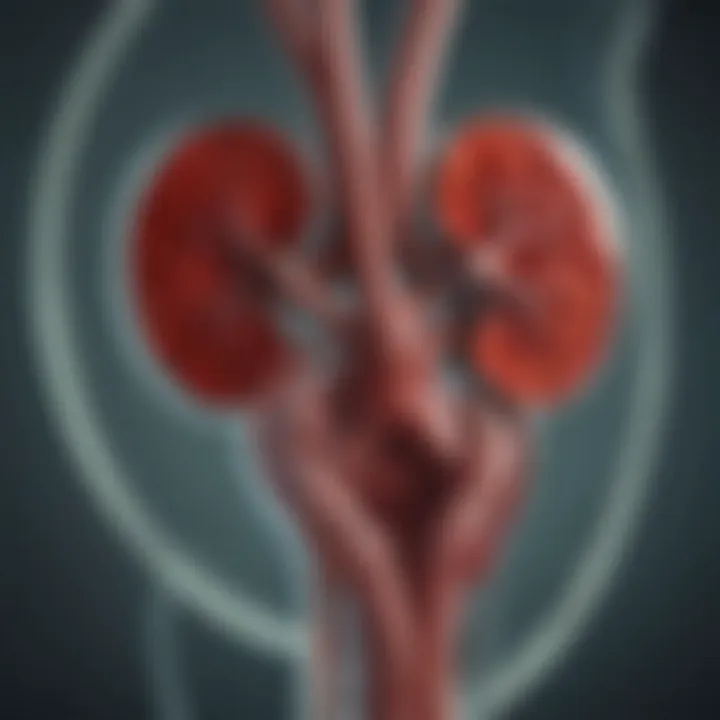
Factors affecting sodium regulation include dietary intake and fluid balance. High sodium consumption can lead to hypertension and fluid retention, putting more stress on the kidneys. Thus, monitoring sodium intake is critical for preventing kidney-related disorders and maintaining overall health.
Potassium and Kidney Function
Potassium plays a vital role in various bodily functions. It is essential for neuromuscular function and maintaining normal heart rhythm. The kidneys manage potassium levels through secretion and reabsorption processes. When kidneys function optimally, they can effectively maintain potassium levels despite dietary fluctuations.
Dysregulation of potassium can lead to hyperkalemia or hypokalemia. Hyperkalemia can be particularly dangerous, causing cardiac complications. Individuals with chronic kidney disease often struggle with potassium management due to decreased kidney function. Regular monitoring of potassium levels is important for those at risk of kidney dysfunction.
Calcium Homeostasis
Calcium is another crucial electrolyte, important for bone health, muscle function, and nerve transmission. The kidneys contribute to calcium homeostasis by reabsorbing calcium from urine. Additionally, they play a role in vitamin D metabolism, which in turn regulates calcium absorption in the intestines.
An imbalance in calcium levels can lead to various health issues. Hypocalcemia, or low calcium levels, can lead to muscle spasms and convulsions, while hypercalcemia, or high levels, can cause kidney stones and cardiovascular issues. The kidneys’ ability to balance calcium is, thus, essential for overall physiological stability.
The intricate balance of electrolytes, regulated by the kidneys, underpins numerous vital processes crucial for health.
In summary, the regulation of electrolytes is a critical aspect of kidney function. Understanding how the kidneys manage sodium, potassium, and calcium can provide insight into maintaining health and preventing disorders. Proper electrolyte balance is essential, and recognizing the role of the kidneys in this process highlights the importance of renal health.
Acid-Base Balance
Acid-base balance is crucial for maintaining the body's internal environment within a narrow pH range. The kidneys are integral to this process, as they help regulate the concentration of acids and bases in the blood. This balance is essential not only for enzymatic activities but also for overall cellular function. When acids or bases are imbalanced, it can lead to severe physiological consequences, affecting many bodily systems.
Immediate and efficient mechanisms are required to counteract changes in pH. The kidneys achieve this through different methods, mainly by excreting hydrogen ions and reabsorbing bicarbonate from urine. Therefore, understanding acid-base balance also involves examining how these processes affect overall health.
Buffers and pH Regulation
Buffers are chemical systems that help maintain pH by resisting changes when acids or bases are added. The main buffer systems in the human body include the bicarbonate buffer system, phosphate buffer system, and protein buffer system. The bicarbonate buffer system is particularly relevant, as it involves carbonic acid and bicarbonate ions that play a significant role in regulating blood pH.
When the body detects an increase in acidity, bicarbonate ions can react with excess hydrogen ions to form carbonic acid, which can then be converted to carbon dioxide and water. This process reduces acidity in the blood. Conversely, if the blood becomes too alkaline, carbonic acid can dissociate to release hydrogen ions, increasing acidity.
Some key points about buffers and their role in pH regulation include:
- Bicarbonate Importance: Bicarbonate serves as one of the primary buffers in extracellular fluid, thus indicating its vital role in acid-base balance.
- Limitations: Buffers can only temporarily neutralize excess acids or bases. Long-term regulation depends on the kidneys and lungs.
- Physiological Role: Maintaining pH requires coordinated actions between renal and respiratory systems to mitigate any disturbances in acid-base balance.
Renal Contributions to Acid-Base Homeostasis
The kidneys contribute to acid-base homeostasis through a few critical processes. They filter blood, allowing for the excretion of hydrogen ions while reabsorbing bicarbonate from the urine. This filtration helps directly control blood acidity.
In a state of acidosis, where the blood has increased acidity, the kidneys increase the excretion of hydrogen ions and enhance bicarbonate reabsorption. Conversely, during alkalosis, when blood is too alkaline, the kidneys can excrete more bicarbonate and reduce hydrogen ion excretion. This regulatory feedback mechanism is crucial for long-term pH stability.
The following points illustrate renal contributions further:
- Ammonium Ion Excretion: Kidneys can convert glutamine to ammonia, which binds to excess hydrogen ions to form ammonium, facilitating the removal of acid from the body.
- Bicarbonate Regeneration: Renal tubular cells can regenerate bicarbonate ions, contributing to correcting metabolic acidosis.
- Long-term Regulation: Unlike the immediate response of buffers, the renal system provides sustained adjustments to maintain acid-base balance, functioning over hours to days.
Maintaining acid-base balance is not just a renal function. It is a comprehensive systemic effort involving both the kidneys and lungs to ensure pH homeostasis, which is vital for healthy bodily function.
Hormonal Regulation
Hormonal regulation is a crucial aspect of kidney function, influencing how the kidneys maintain homeostasis and respond to the body’s needs. Hormones are biochemical messengers that play various roles in numerous physiological processes. In the context of renal function, they regulate fluid and electrolyte balance, blood pressure, and the production of red blood cells. Understanding these hormonal pathways benefits not only healthcare professionals but also researchers and educators focusing on renal physiology and related domains.
Renin-Angiotensin System
The Renin-Angiotensin System (RAS) is vital for blood pressure regulation and fluid balance. When blood pressure drops or the sodium concentration falls, specialized cells in the kidneys release an enzyme called renin. Renin initiates a cascade that converts angiotensinogen, a protein produced by the liver, into angiotensin I. This inactive precursor further transforms into angiotensin II through the action of the angiotensin-converting enzyme (ACE), primarily found in the lungs.
Angiotensin II serves multiple roles:
- Vasoconstriction: It narrows blood vessels, increasing blood pressure.
- Aldosterone secretion: It triggers the adrenal glands to secrete aldosterone, a hormone that enhances sodium reabsorption in the kidneys.
- Thirst stimulation: It increases thirst, prompting fluid intake to help restore blood volume.
This hormonal feedback loop showcases a sophisticated mechanism by which the kidneys maintain hemodynamic stability. Disruptions in this system can lead to hypertension or heart failure, making it an important focus in clinical medicine and research.
Erythropoietin Production
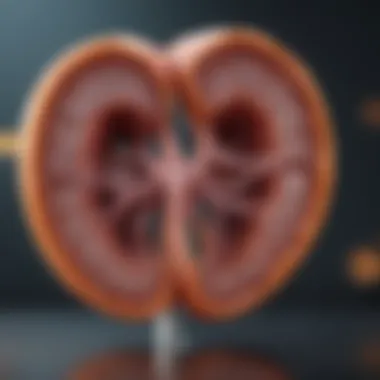
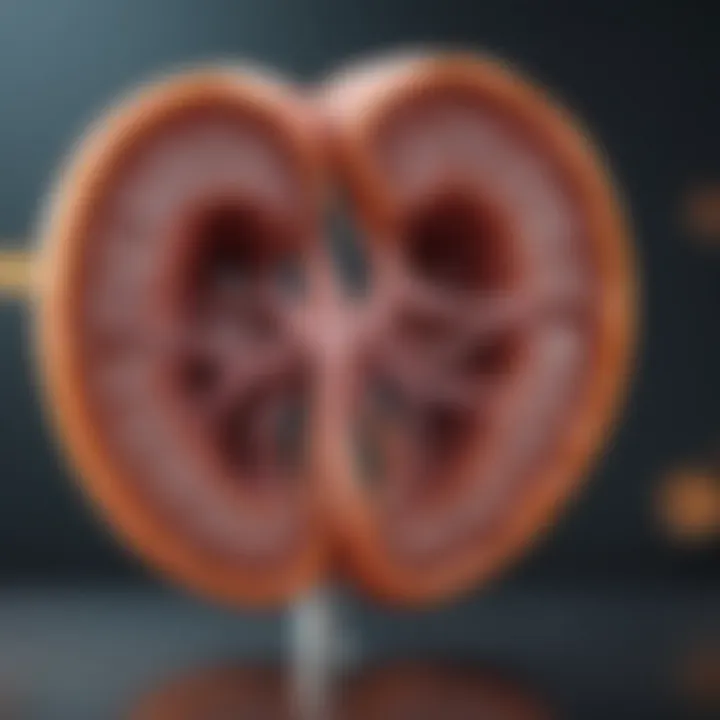
Erythropoietin (EPO) is another key hormone produced by the kidneys and plays a significant role in hemoglobin synthesis and red blood cell production. EPO secretion is stimulated by low oxygen levels in the blood, a condition known as hypoxia. The kidneys respond by increasing EPO production, which then travels to the bone marrow, promoting the formation of red blood cells.
The implications of EPO are significant:
- Enhancing oxygen delivery: Increased red blood cell mass improves oxygen transport throughout the body, meeting metabolic demands.
- Clinical relevance: EPO is widely used in the treatment of anemia, particularly in patients with chronic kidney disease (CKD) who may not produce sufficient EPO.
Overall, hormonal regulation by the kidneys illustrates their multifaceted role within the body’s regulatory systems. It highlights the importance of maintaining renal health, as dysfunction can disrupt these critical hormone pathways.
Metabolic Functions of the Kidneys
The kidneys are not just waste filtration organs; they have critical metabolic functions that significantly impact overall health. The metabolic roles of the kidneys contribute to the regulation of various substances in the body, including vitamins, minerals, and glucose. Understanding these functions can provide insights into their broader significance in homeostasis and the implications of renal dysfunction.
Vitamin Activation
One of the primary metabolic functions of the kidneys is the activation of vitamin D. When humans consume vitamin D, it is first converted into 25-hydroxyvitamin D in the liver. The kidneys further convert this compound into the active form, known as 1,25-dihydroxyvitamin D. This active form is crucial for calcium and phosphate metabolism, impacting bone health and mineral regulation in the body.
Key Points about Vitamin Activation:
- Calcium Absorption: 1,25-dihydroxyvitamin D enhances the intestine's ability to absorb calcium, ensuring adequate levels for bone mineralization.
- Bone Density: Proper activation of vitamin D is vital for maintaining bone density, preventing conditions like osteoporosis.
- Hormonal Balance: Through its role in calcium metabolism, activated vitamin D influences the secretion of parathyroid hormone, which regulates calcium levels in the blood.
The relationship between renal function and vitamin D metabolism underscores the important role of the kidneys in maintaining mineral balance, highlighting the consequence of kidney impairments on vitamin D activation and subsequent bone health issues.
Glucose Metabolism
The kidneys also play a significant role in glucose metabolism, which is often overlooked. They help maintain blood glucose levels through a process called gluconeogenesis, where glucose is synthesized from non-carbohydrate sources. Although the liver is the primary site for gluconeogenesis, the kidneys contribute, especially during prolonged fasting or stress.
Glucose Management Functions:
- Renal Threshold for Glucose: The kidneys reabsorb glucose from urine until a certain point known as the renal threshold. Beyond this threshold, excess glucose is excreted, which can indicate conditions like diabetes mellitus.
- Regulatory Hormones: Insulin and glucagon affect how glucose is handled by the kidneys, making them integral to glucose homeostasis.
- Energy Production: The kidneys utilize glucose as an energy source to support their own metabolic activities, indicating their reliance on this critical fuel.
Understanding the metabolic functions of the kidneys provides important context for their contribution to overall health. Impaired kidney function can severely disrupt vitamin D activation and glucose metabolism, leading to systemic imbalances.
In summary, the kidneys play multifaceted roles beyond filtration. Their involvement in vitamin D activation and glucose metabolism helps maintain key physiological processes, stability, and health. Recognizing these functions can guide treatment approaches and preventive measures for kidney-related disorders.
Impact of Kidney Dysfunction
The impact of kidney dysfunction on overall health is profound. The kidneys are essential organs that perform numerous functions vital to maintaining homeostasis. Dysfunction can lead to several complications that affect both the kidneys and other organ systems. Understanding this impact is critical for prevention and treatment. Knowledge of kidney dysfunction helps clinicians and patients make informed decisions regarding management and lifestyle adjustments.
Chronic Kidney Disease
Chronic Kidney Disease (CKD) is a gradual loss of kidney function over time. It is a significant public health issue affecting millions worldwide. Early detection is important as many patients do not exhibit symptoms in the initial stages. Risk factors include diabetes, hypertension, and certain genetic conditions. CKD can progress to end-stage renal disease requiring dialysis or transplantation.
Patients with CKD may experience complications such as anemia, bone disease, and cardiovascular issues due to imbalances in electrolytes and minerals. Regular monitoring through blood tests and urine analysis is essential in managing CKD. It allows for timely interventions that can slow progression and improve quality of life.
"Kidney health is not just a medical concern; it reflects our overall well-being and lifestyle choices."
Effective management requires a multidisciplinary approach. Collaboration among nephrologists, dietitians, and primary care providers is crucial. Dietary modifications, such as reducing protein intake and managing sodium, help alleviate strain on the kidneys.
Acute Kidney Injury
Acute Kidney Injury (AKI) is characterized by a rapid decline in kidney function. This decline can occur over hours to days and often results from severe dehydration, infection, or exposure to certain medications. AKI can be reversible, depending on the cause and promptness of treatment. However, it may lead to chronic kidney issues if not addressed promptly.
Recognizing the signs of AKI is essential for effective treatment. Common signs include decreased urine output, swelling, and fatigue. Immediate medical intervention is often required to restore kidney function and prevent further damage. Diagnostic methods such as blood tests can help identify the cause and inform treatment strategies.
Management of AKI focuses on restoring kidney function and addressing the underlying cause. Monitoring fluid intake and kidney function is necessary during recovery to avoid complications. Patients may require hospitalization for severe cases, emphasizing the need for awareness of kidney health in acute settings.
In summary, both Chronic Kidney Disease and Acute Kidney Injury highlight the necessity of understanding kidney function. Prompt recognition and management can greatly enhance patient outcomes. By shedding light on the implications of kidney dysfunction, healthcare professionals can better guide their patients towards improved renal health.
Diagnostic Methods for Assessing Kidney Function
Assessing kidney function is essential in understanding overall renal health. The kidneys are critical organs involved in multiple physiological processes. Detecting issues with kidney function can lead to timely interventions that may slow down or prevent diseases, particularly chronic kidney disease. Various diagnostic methods are employed to evaluate kidney performance, and each method provides unique insights into renal health.
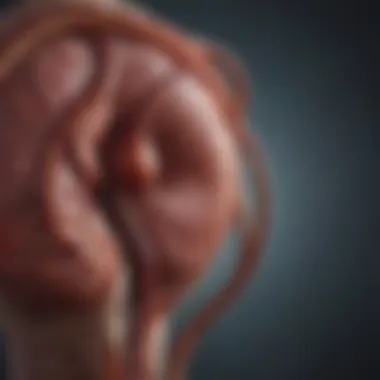
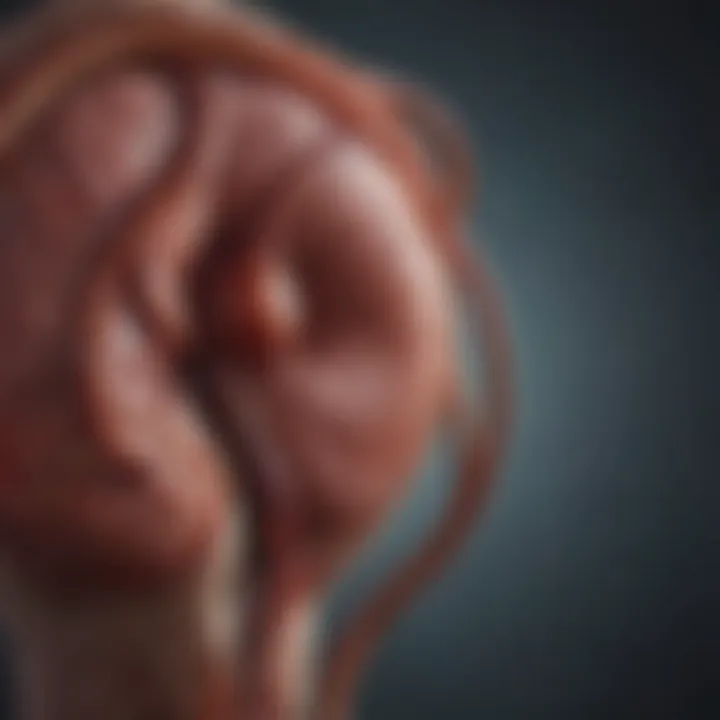
Using accurate diagnostic techniques can help in establishing a diagnosis, evaluating the stage of a disorder, and monitoring the response to treatments. It allows healthcare providers to develop tailored management plans.
Blood Tests and Urinalysis
Blood tests and urinalysis are the cornerstone of kidney function assessment. These tests measure waste products in the blood and urine, providing direct information on renal filtration abilities. Common blood tests include serum creatinine and blood urea nitrogen (BUN). Elevated levels of these substances may indicate reduced kidney function.
- Serum Creatinine: This is a waste product from muscle metabolism. Its level in the blood increases if the kidneys are not filtering effectively.
- Blood Urea Nitrogen (BUN): This test measures the amount of urea nitrogen in the blood. Increased BUN can suggest kidney dysfunction, although it can also be influenced by protein intake and hydration status.
Urinalysis also plays an important role. It can detect abnormal constituents in urine, such as proteins, glucose, and red or white blood cells, which can signify issues like kidney disease, infections, or other conditions. For example:
- Protein in urine: Presence may indicate conditions such as nephrotic syndrome or glomerulonephritis.
- Glucose in urine: Can be a sign of diabetes or kidney issues.
Both blood tests and urinalysis offer a non-invasive way to gather vital information about kidney health. They are relatively inexpensive and can provide quick results, making them indispensable tools in clinical settings.
Imaging Techniques
Imaging techniques further enhance the assessment of kidney function and structure. While blood tests and urinalysis provide biochemical data, imaging helps visualize anatomical features and detect abnormalities the tests may not reveal. Some common imaging methods include:
- Ultrasound: This is often the first step in imaging. It uses sound waves to create images of the kidneys. It can identify tumors, obstructions, or structural changes.
- CT Scans: A specialized type of X-ray that provides detailed cross-sectional images. It can help detect masses or stones that may obstruct normal kidney function.
- MRI: Magnetic Resonance Imaging provides another detailed look, especially useful in examining kidney tumors or vascular issues.
Each of these imaging techniques has its benefits and limitations. For instance, ultrasounds are safer due to the lack of radiation, while CT scans provide more detail.
In summary: Combining blood tests, urinalysis, and imaging techniques provides a comprehensive picture of kidney health. Early detection through these methods can translate into timely interventions, significantly impacting patient outcomes.
Understanding these diagnostics will foster greater awareness of kidney function and the importance of maintaining renal health.
Prevention and Management of Kidney Disorders
Recognizing the significance of kidney health is essential in today’s fast-paced world. The prevention and management of kidney disorders is a critical area that has implications not only for individual well-being but also for broader public health. Millions suffer from kidney-related issues, many of which can be prevented or effectively managed through early intervention and lifestyle choices. Understanding the preventive measures and management strategies is vital for maintaining optimal kidney function and overall health.
Dietary Considerations
Diet plays a significant role in preserving kidney health. A balanced diet can help to minimize the risk of developing kidney problems and can also assist in managing existing conditions.
Some important dietary guidelines include:
- Limit Sodium Intake: High sodium levels can increase blood pressure, putting stress on the kidneys. Reducing the consumption of processed foods, which are often high in sodium, can be beneficial.
- Control Protein Consumption: While protein is essential for body function, excessive intake can burden the kidneys. Individuals, especially those with existing kidney disease, should consult with healthcare professionals to determine optimal protein levels.
- Increase Fluid Intake: Adequate hydration supports kidney function by helping to flush out toxins. While fluid needs vary, drinking sufficient water can prevent the formation of kidney stones and urinary tract infections.
- Focus on Whole Foods: Staying with whole grains, fresh fruits and vegetables, and healthy fats supports overall health and kidney function. Processed foods often lack essential nutrients and may harm kidney health.
"A well-planned diet not only helps in prevention but also acts as a management tool for those with kidney disorders."
Lifestyle Adjustments
Beyond dietary choices, lifestyle adjustments are equally important for kidney health. Making deliberate changes can help mitigate risk factors associated with kidney disorders.
Key lifestyle adjustments include:
- Regular Exercise: Engaging in physical activity can help control blood pressure, manage weight, and improve overall cardiovascular health — all of which are crucial for protecting the kidneys.
- Avoid Smoking: Smoking is harmful to blood vessels and can lead to kidney damage. Quitting smoking can significantly improve all aspects of health, including renal function.
- Limit Alcohol Consumption: Excessive alcohol intake can lead to dehydration and hypertension, both risk factors for kidney disease. Moderation is key.
- Manage Chronic Conditions: Effectively managing conditions such as diabetes and hypertension through regular check-ups can play a preventative role in kidney health.
Future Directions in Kidney Research
Research on kidney function continually evolves, with increasing focus on innovative approaches to address renal disorders. This emphasis is vital for improving patient outcomes and understanding the complexities of kidney health. New findings can lead to better treatment options and enhance preventive measures for kidney-related diseases.
Innovative Treatments
The field of kidney research is witnessing breakthroughs in innovative treatments. These therapies aim to enhance kidney function and improve the quality of life for those with chronic and acute conditions. Here are some key advancements:
- Gene therapy: Recent studies explore the potential of gene editing to repair or replace faulty genes that contribute to kidney diseases.
- Nanotechnology: Researchers are examining the use of nanoparticles for targeted drug delivery, allowing for more effective treatments with fewer side effects.
- Biologics: This includes monoclonal antibodies that target specific pathways involved in kidney disease. Such targeted therapies could potentially halt disease progression.
These innovations represent a paradigm shift in management practices, allowing for more precise and customized care.
Potential for Regenerative Medicine
Regenerative medicine holds immense promise for patients with kidney disorders. This field focuses on repairing or replacing damaged kidney tissues and restoring their functions. Key aspects include:
- Stem cell therapy: There are ongoing studies assessing the efficacy of stem cells in promoting kidney repair. Early experiments show potential for regenerating renal cells and improving kidney functionality.
- Tissue engineering: This involves creating bioengineered kidney tissues using cells and biomaterials. Although still in experimental stages, this approach may one day lead to functional kidney replacements.
Recent research indicates that combining stem cell therapy with kidney organoids could enhance regenerative outcomes for patients.
- Clinical trials: Various trials aim to test these therapies' safety and effectiveness in humans. The outcomes could define new therapeutic strategies for chronic kidney disease.



